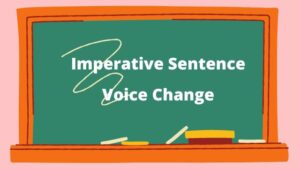Voice Change of Imperative Sentence
Voice Change of Imperative Sentence
The sentences with which we express our order, advice, and request are called imperative sentences.
For example:
- Please bring a glass of water.
- Open the door.
- Respect the seniors.
- Pass the mobile phone, kindly.
- Don’t make a noise.
- Don’t spit on the floor.
- Don’t tell a lie.
In this aspect, imperative sentences are three types order, request, and advice.
Transitive and intransitive verbs are very important in case of voice change of imperative sentences.
Transitive verb: This type of verb has an object.
Intransitive verb: This type of verb has no object.
We have discussed active and passive voice (A to Z), click here……..
Imperative Sentence With Order/Command
In imperative sentences, order and advice look the same in structure and appearance but there is a difference of meaning. You can learn another rule of voice change of advice below.
If the verb is transitive, the below rules are suitable.

Rules of voice change
Affirmative: Let + Object + be + V-3.
Negative: Let + not + Object + be + V-3.
Example:
Active: Change the voice.
Passive: Let the voice be changed.
Active: Shut the door.
Passive: Let the door be shut.
Active: Clean your room.
Passive: Let your room be cleaned.
Active: Put off the shirt.
Passive: Let the shirt be put off.
Active: Use your phone.
Passive: Let your phone be used.
Active: Submit the form.
Passive: Let the form be submitted.
Active: Do not close the door.
Passive: Let the door not be closed.
Active: Open the window.
Passive: Let the window be opened.
Active: Do not pluck flowers.
Passive: Let not flowers be plucked.
Active: Do not waste time.
Passive: Let not time be wasted.
Active: Don’t open the door.
Passive: Let not the door be opened.
Voice Change of Imperative Sentence (Active to Passive)
Imperative Sentence With Advice/Suggestion
This rule is only for transitive verbs.
Object + should + be + V-3.
Example:
Active: Prepare your lessons.
Passive: your lessons should be prepared.
Active: Take medicine on time.
Passive: Medicine should be taken on time.
Active: Always speak the truth.
Passive: The truth should be always spoken.
Active: Never tell a lie.
Passive: A lie should be never told.
Active: Always respect the seniors.
Passive: The seniors should be always respected.
Active: Never neglect the poor.
Passive: The poor should be never neglected.
Active: Wash your shirt properly.
Passive: Your shirt should be properly washed.
If the verb is intransitive, the below rules are applicable.
You are told to …………..
You are ordered to ……………
You are advised to …………..
Example:
Active: Come in.
Passive: You are told to come in.
Active: Go to bed.
Passive: You are ordered to go to bed.
Active: Follow me.
Passive: You are ordered to follow me.
Active: Wait for me.
Passive: You are told to wait for me.
Active: Get out of here.
Passive: You are ordered to get out of here.
Active: Speak clearly.
Passive: You are told to speak clearly
For Negative Sentences
You are told not to …………..
You are ordered not to ……………
You are advised not to …………..
Example:
Active: Don’t talk.
Passive: You are told not to talk.
Active: Don’t play here.
Passive: You are ordered not to play here.
Active: Don’t misbehave.
Passive: You are advised not to misbehave.
Active: Don’t shout.
Passive: You are told not to shout.
Active: Don’t jump here.
Passive: You are ordered not to jump here.
Active: Don’t spit on the floor.
Passive: You are ordered not to spit on the floor.
Active: Don’t sit on the bench.
Passive: You are told not to sit on the bench.
Active: Don’t talk much.
Passive: You are ordered not to talk much.
Active: Never tell a lie.
Passive: You are advised not to tell a lie.
Active and Passive Voice in Bangla Click Here……..
Voice Change of Imperative Sentence
Imperative Sentence With Request
By imperative sentences we express request. We write the word “Please/Kindly” at the starting or end of the sentence.
If we notice the term “Please/Kindly” in the imperative sentences, this rule is followed.
Affirmative: You are requested to …………….
Negative: You are requested not to …………….
Example:
Active: Please help me.
Passive: You are requested to help me.
Active: Please do not chatter.
Passive: You are requested not to chatter.
Active: Please join me in your WhatsApp group.
Passive: You are requested to join me in your WhatsApp group.
Active: Don’t pluck flowers, please.
Passive: You are requested not to pluck flowers.
Active: Please forgive me for this time.
Passive: You are requested to forgive me for this time.
Active: Please come to the point.
Passive: You are requested to come to the point.
Active: Don’t rake up the past, please.
Passive: You are requested not to rake up the past.
Active: Please, switch on the fan.
Passive: You are requested to switch on the fan.
Active: Kindly grant my application.
Passive: You are requested to grant my application.
Active: Please don’t reject my form.
Passive: You are requested not to reject my form.
Active: Tell again your contact number, kindly.
Passive: You are requested to tell again your contact number
Read more:
- Narration Change
- Degree Change
- Transformation of sentences (Simple/Complex and Compound)
- Joining of sentences
- Voice Change
- Transformation of sentences (Affirmative to Negative)
- Type of sentences
If you think that this article (Voice Change of Imperative Sentence ) is good and necessary, you can share it with your friends and relatives through social media like WhatsApp, Facebook and Messenger. Thank you!- Prakash sir
